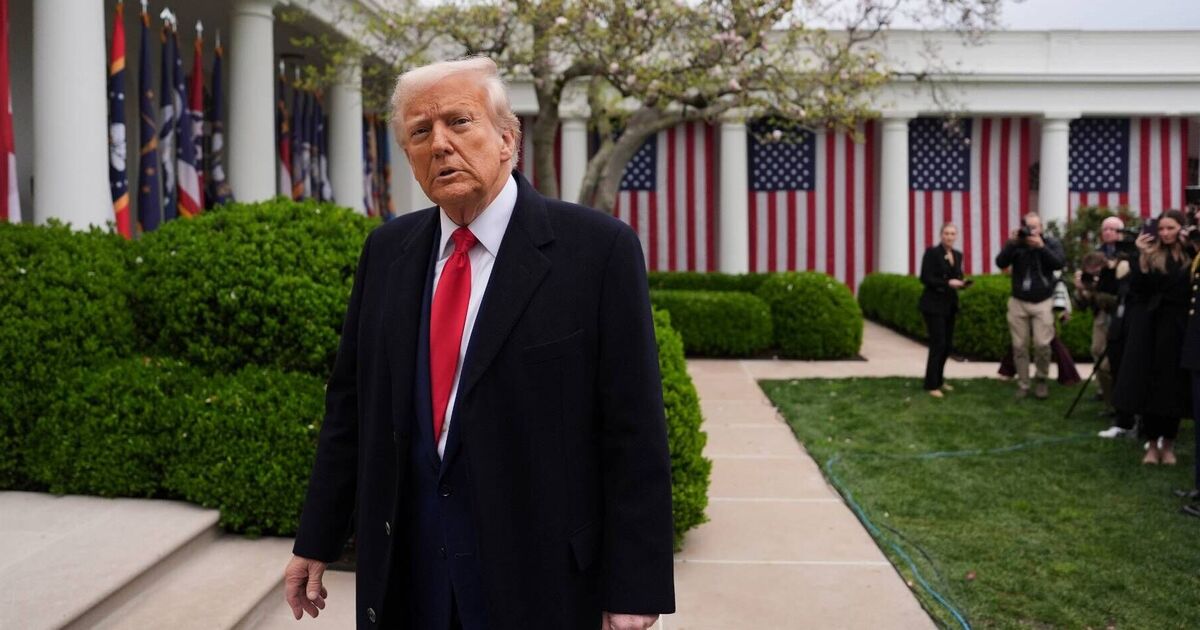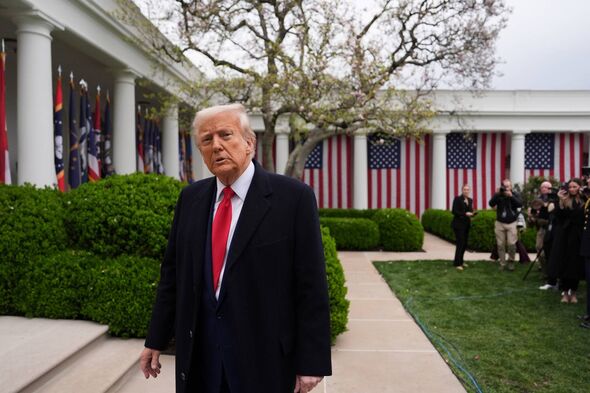
President Donald Trump departs after signing an executive order at an event to announce new tariffs in the Rose Garden of the White House, Wednesday, April 2, 2025, in Washington (Image: AP)
A U.S. federal appeals court on Friday delivered a significant blow to President Donald Trump‘s global trade tariffs, ruling that he overstepped his legal authority by unilaterally imposing import taxes on goods from dozens of countries worldwide.
The U.S. Court of Appeals for the Federal Circuit in Washington, D.C. questioned the legality of what Trump had termed “reciprocal tariffs” implemented during his trade war in April. The court further ruled that Trump exceeded his authority when he imposed tariffs on China, Mexico, and Canada in February.
“The statute bestows significant authority on the President to undertake a number of actions in response to a declared national emergency, but none of these actions explicitly include the power to impose tariffs, duties, or the like, or the power to tax,” the court stated in its Friday ruling.
This ruling largely upheld an earlier decision by a specialized federal trade court in New York, which determined that Trump did not have the legal authority to impose tariffs on nearly every country in the world under the pretense of a national emergency declaration. However, the 7-4 decision by the federal appeals court dismissed part of the lower court’s ruling that immediately struck down the tariffs, allowing the administration time to appeal to the Supreme Court.
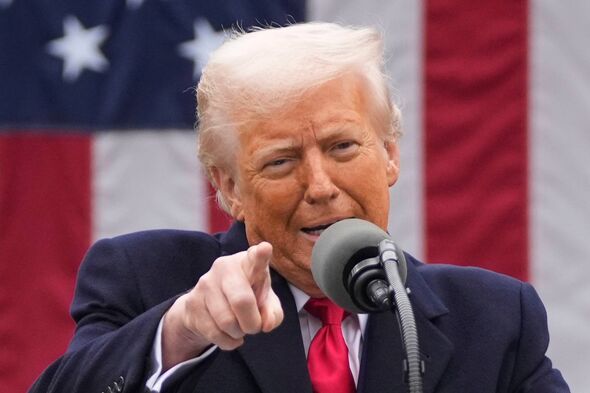
President Donald Trump speaks during an event to announce new tariffs in the Rose Garden at the White House, Wednesday, April 2, 2025, in Washington (Image: AP)
This decision significantly undermines Trump’s economic agenda and his ambitions to unilaterally impose tariffs and disrupt decades of trade policy without any input from Congress.
His tariffs – and their chaotic implementation – have rattled international markets, estranged trading partners and allies, and sparked concerns about inflation and economic slowdown.
Trump was swift to hit back on social media after the court’s ruling, insisting the tariffs remain active and branding the appeals court as “highly partisan.
“ALL TARIFFS ARE STILL IN EFFECT! Today a Highly Partisan Appeals Court incorrectly said that our Tariffs should be removed, but they know the United States of America will win in the end. If these Tariffs ever went away, it would be a total disaster for the Country. It would make us financially weak, and we have to be strong,” Trump posted on TruthSocial Friday evening.
Trump has predominantly operated with reckless abandon regarding his tariff powers, imposing many against nations for political disputes unrelated to trade policy matters. This encompasses his 50% tariff on all Brazilian imports, as payback for the nation’s continued criminal prosecution of former President Jair Bolsonaro over his efforts to reverse his 2022 electoral defeat to current President Luiz Inacio Lula da Silva.
DONT MISS:
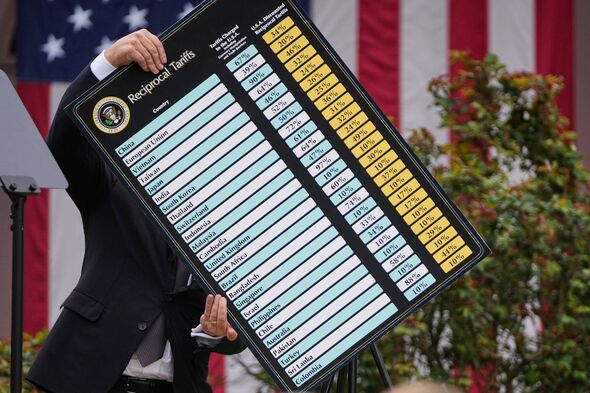
Commerce Secretary Howard Lutnick holds a chart as President Donald Trump speaks during an event to announce new tariffs in the Rose Garden at the White House, Wednesday, April 2, 2025, in Washington (Image: AP)
Regardless of the court’s ruling, Trump possesses alternative legislation for implementing import duties, though these would restrict the pace and intensity of his actions. However, he’s also leveraged these tariffs to pressure the European Union, Japan, and other nations into accepting trade deals that favor the U.S., and to funnel tens of billions of dollars into the federal Treasury to help offset the massive tax cuts he enacted on July 4.
“Existing trade agreements may not necessarily fall apart, but the administration could lose a key element of its negotiation strategy. This could embolden foreign governments to resist future demands, delay the execution of previous commitments, or even seek to renegotiate terms,” stated Ashley Akers, senior counsel at the Holland and Knight law firm and a former Justice Department trial lawyer, prior to the appeals court decision. “A ruling against the tariffs would signify not just a legal defeat, but a significant setback to the administration’s forceful trade diplomacy model.”
The government might also have to reimburse some of the import taxes it has collected, dealing a financial blow to the U.S. Treasury.
By July, revenue from tariffs had reached $142 billion, more than double what it was at the same point the previous year. In fact, the Justice Department cautioned in a legal document this month that revoking the tariffs could spell “financial ruin” for the United States.
The ruling pertains to two sets of import taxes, both of which Trump justified by declaring a national emergency under the 1977 International Emergency Economic Powers Act (IEEPA):.
On April 2, which he dubbed “Liberation Day,” the President announced sweeping tariffs. He imposed “reciprocal” tariffs of up to 50% on countries with which the United States runs trade deficits and a ” tariffs of up to 50% on countries with which the United States has trade deficits and a “baseline” 10% tariff on nearly everyone else.
The national emergency justifying these tariffs, according to Trump, was the persistent gap between what the U.S. sells and what it buys from the rest of the world. In August, the President began adjusting the tariff rates, but goods from countries with which the U.S. has a surplus also face these taxes.
On February 1, he announced what he called “trafficking tariffs” he announced Feb. 1 on imports from Canada, China and Mexico. These were designed to get those countries to do more to stop what he declared a national emergency: the illegal flow of drugs and immigrants across their borders into the United States.
The Constitution gives Congress the power to impose taxes, including tariffs. But over decades, lawmakers have ceded authorities to the president, and Trump has made the most of the power vacuum. But Trump’s assertion that IEEPA essentially gives him unlimited power to tax imports quickly drew legal challenges — at least seven cases. No president had ever used the law to justify tariffs, though IEEPA had been used frequently to impose export restrictions and other sanctions on U.S. adversaries such as Iran and North Korea.”
on imports from Canada, China, and Mexico. These were intended to pressure these countries into doing more to halt what he declared a national emergency: the illegal influx of drugs and immigrants across their borders into the United States.
The Constitution grants Congress the authority to impose taxes, including tariffs. However, over the years, lawmakers have gradually transferred this power to the president, and Trump has taken full advantage of this shift in authority.
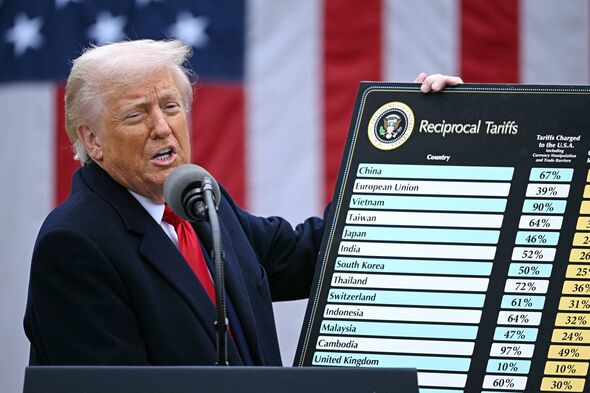
US President Donald Trump holds a chart as he delivers remarks on reciprocal tariffs during an event in the Rose Garden entitled “Make America Wealthy Again” at the White House in Washington, DC, on April 2, 2025. A US federal court on May 28 blocked Donald Trump’s “Liberation Day” import tariffs from going into effect, ruling that the president had overstepped his authority with the across-the-board levies. Trump unveiled sweeping tariffs on most trading partners on April 2, with a baseline 10 percent, plus steeper duties on China and the European Union (Image: AFP via Getty Images)
Trump’s claim that IEEPA essentially provides him with unlimited power to tax imports quickly faced legal challenges – at least seven cases. No president had ever used the law to justify tariffs, although IEEPA had been frequently employed to enforce export restrictions and other sanctions on U.S. adversaries such as Iran and North Korea.
“President Trump lawfully exercised the tariff powers granted to him by Congress to defend our national and economic security from foreign threats. The President’s tariffs remain in effect, and we look forward to ultimate victory on this matter.” White House Spokesman Kush Desai said in statement on Friday via email.
The complainants contend that the emergency authority legislation does not permit the implementation of tariffs.
They further emphasize that the trade imbalance scarcely qualifies as an “unusual and extraordinary” danger that would warrant proclaiming an emergency under the statute. The United States, it should be noted, has maintained trade imbalances – where it purchases more from international nations than it exports to them – for 49 consecutive years through both prosperous and challenging periods.
